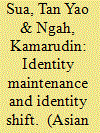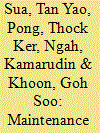|
|
|
Sort Order |
|
|
|
Items / Page
|
|
|
|
|
|
|
| Srl | Item |
| 1 |
ID:
117695


|
|
|
|
|
| Publication |
2013.
|
| Summary/Abstract |
This paper examines the state of identity maintenance and identity shift among the Tirok Chinese Peranakan in Terengganu who are an acculturated rural Chinese community in a Malay populated area. The current older generation still maintains the Peranakan identity, featuring strong Malay cultural influence. Their acculturation by the larger Malay community could be attributed to the combination of three factors: confinement to a Malay environment, common schooling with the local Malays and strong Sino-Malay ties. Malay cultural influence is most evident in their spoken language, building architecture, dressing style, cuisine, eating habits and female inheritance rights. However, amidst acculturation, they still maintain a strong Chinese identity that has been manifested through their observance of Chinese religious and cultural practices, their usage of the Chinese dialect as the home language, their preference for wearing Chinese-style attire in public and their preference for intra-ethnic marriages. But the Peranakan identity has been eroded over the years. There is a noticeable identity shift among the current younger generation as new intervening socio-cultural factors have reduced their interactions with the local Malays and heightened their Chinese identity. The degree of identity shift, however, differs between the current second and third generations and also between those who have moved to town and those who remain in Tirok.
|
|
|
|
|
|
|
|
|
|
|
|
|
|
|
|
| 2 |
ID:
114686


|
|
|
|
|
| Publication |
2012.
|
| Summary/Abstract |
This paper surveys the roles of seven Chinese associations in Kuala Terengganu in maintaining and propagating Chinese culture within a Malay state. These associations have played significant roles in maintaining and propagating Chinese culture as far as the range of cultural activities hosted by them is concerned. There is also a reasonable level of state cultural leadership, though lacking in certain areas. But the small population and the outflow of the younger generation have presented a host of problems to the Chinese associations with regard to the required critical mass, pool of talent, injection of ideas and second-tier leadership. The lack of financial support is yet another problem arising from the peripheral role of the Chinese in the state economy and their small numbers. Meanwhile, leaders of the Chinese associations exercise restraint so as not to infringe on Malay religious sensitivity when hosting outdoor cultural activities during the Muslim ritual periods. They also exhibit a high degree of tolerance towards Islamisation programmes undertaken by the state as long as these programmes do not encroach into their private socio-cultural domains. Despite their small population, the Chinese in Kuala Terengganu are a politically significant minority as a result of the political outbidding among the Malays. Leaders of the Chinese associations have benefited from such a position in resolving certain long-standing cultural issues.
|
|
|
|
|
|
|
|
|
|
|
|
|
|
|
|
| 3 |
ID:
141156


|
|
|
|
|
| Summary/Abstract |
This study explores the Terengganu and Kelantan Peranakan Chinese foodways with special reference to two types of foods: daily and ancestral prayer foods. The principal focus is to illustrate the negotiation of identity through foodways as well as internal contradictions arising from this process of identity negotiation. These two groups of Peranakan Chinese are largely the product of acculturation by the local Malays through socio-cultural interactions, though the Kelantan Peranakan Chinese are also acculturated by the local Thai community. Their daily and ancestral prayer foods display contrasting identities that stem from the negotiating of their acculturated and primordial identities. The former displays a strong local cultural influence, while the latter displays a strong Chinese cultural influence. However, despite the pervasive influence of localisation in their daily foods, elements of hybridisation are visible in some occasionally prepared food items. Meanwhile, localised and hybrid food items are included in their ancestral prayer foods, which are supposed to express their primordial Chinese identity. These internal contractions illustrate the complexity of the negotiation of identity through foodways within a cross-cultural context.
|
|
|
|
|
|
|
|
|
|
|
|
|
|
|
|
|
|
|
|
|